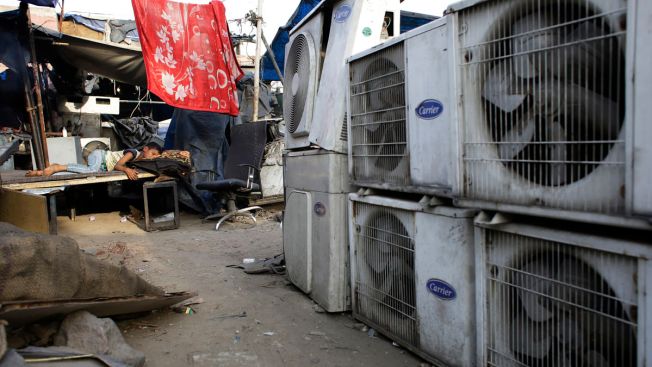Climate wins as another global deal tolimit emissions is reached
- by Minnie Bishop
- in Research
- — Oct 18, 2016
Canada was also one of the countries that took part in the climate agreement, which was an amendment to the 1987 ozone-saving Montreal Protocol.
Almost 200 countries struck a landmark deal Saturday to reduce the emissions of powerful greenhouse gases, hydrofluorocarbons (HFCs), in a move that could prevent up to 0.5 degrees Celsius of global warming by the end of this century.
"This is about much more than the ozone layer and HFCs".
Saturday's agreement in Kigali, Rwanda, is the biggest single step to limit climate change since governments reached a global agreement in Paris previous year to shift the world economy from fossil fuels this century.
Different blocs agreed on varying baseline years upon which they would phase out HFCs.
Dignitaries meeting in Kigali have pledged to phase-out the use of harmful greenhouse gases commonly used in refrigeration and air conditioning. Some more recent research indicates HFCs may be less powerful in trapping heat than once feared, said Michiel Schaeffer of Climate Analytics.
"Last year in Paris, we promised to keep the world safe from the worst effects of climate change. It is a clear statement by all world leaders that the green transformation started in Paris is irreversible and unstoppable", said United Nations environment programme executive director Erik Solheim.
Due to a growing demand for cooling, particularly in developing countries like Pakistan, with hot climates and an expanding middle class, HFC emissions were increasing by 10% globally every year.
"It's a huge step forward", said U.S. Secretary of State John Kerry, who participated in the talks.
US, S. Korea: DPRK missile test failed
Under Kim Jong Un , who took power in 2011, the country has carried out its fourth and fifth nuclear tests this year. The first five launch attempts failed, before a successful launch was achieved on the sixth attempt in June.
"It's a very historic moment, and we are all very delighted that we have come to this point where we can reach a consensus and agree to most of the issues that were on the table", said India's chief delegate, Ajay Narayan Jha.
Small island states and other countries, including many in Africa, that say they face the biggest threat from climate change are urging action on HFCs, and soon.
Countries also agreed to provide adequate financing for HFCs reduction, the cost of which is estimated at billions of dollars globally.
Durwood Zaelke, President of the Institute for Governance and Sustainable Development, said the Kigali deal will mean the "largest temperature reduction ever achieved by a single agreement".
He said: "This was the first real test faced by nations since they committed to limiting global warming in the Paris Agreement".
To put it into context, HFCs are thousands of times more potent than, carbon dioxide.
"While the freeze dates and step down levels are ambitious, the HVACR industry is confident we can meet them", Yurek said.
The original aim of the Montreal Protocol was to stop the depletion of the ozone layer, which shields the planet from ultraviolet rays linked to skin cancer and other conditions.

